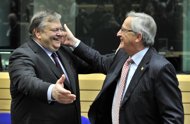EU bids to close book on Greece, re-boot economy

With recession returning to the eurozone after two years of austerity, EU president Herman Van Rompuy signalled the need for a new agenda arising out of a two-day European Union summit.
"I'm not saying we are out of the rut but we have reached a turning-point in the crisis," Van Rompuy said.
"The crisis is not over and we must remain vigilant but everything we have done is now bearing fruit," he said.
An advance deal to approve provisionally the first part of a second bailout for Greece cleared the way for a fresh debate on how to get Europe's economy motoring again.
Greece's debts run to 350 billion euros ($466 billion) and the eurozone rescue package will throw 237 billion euros at the problem, with top-up aid from the International Monetary Fund.
The first part of the bailout involves private investors in Greek government bonds agreeing to a write-down wiping out 107 billion euros of debt.
Once that is accomplished, the other 130 billion euros in loans can be made.
Ahead of the talks, eurozone finance ministers said Greece had fulfilled most of a long list of conditions set last month.
Governments though kept pressure on private investors for another week.
German Finance Minister Wolfgang Schaeuble said the "freeing-up" of taxpayer loans would depend on the take-up of tough terms negotiated with private investors over months and would finally be done "provisionally in a conference call next Friday," March 9.
"We will check next week the state of play on PSI and this case should therefore be wrapped up in a positive way," said Italian Prime Minister Mario Monti said, referring to the Private Sector Initiative write-down deal.
Insurers in London also provided a boost when they said they would not trigger default insurance payouts as a result of the PSI terms, a big worry last year.
As acceptances of the swap terms are compiled over the next couple of weeks, eurozone governments through the European Central Bank (ECB) will put in place temporary guarantees worth 35 billion euros in case things go wrong.
The debate on growth -- ranging from proposals to liberalise trading links with the United States and China, to revamping Europe's patchwork of tax systems -- followed new figures earlier in the day showing unemployment at a record high 10.7 per cent across the 17-nation eurozone.
A statement drafted for the leaders demands an "urgent" rethink on how to reach a two-year-old target to boost employment among adults to 75 per cent -- when more than 24 million people are out of work across the EU.
British Prime Minister David Cameron was one of 12 leaders pushing for a liberal trade-inspired revamp of EU economic policy but diplomats said not all of the ideas put forward also countries such as Italy, but not Germany and France, would be taken forward.
"The aim is to get as many of those measures approved as possible," Cameron said.
Schemes for a cross-border corporation tax and a levy on the financial sector cherished by the French and supported by a minimum quorum would likely generate opposition.
Confirmed in a new 30-month mandate as EU head and also chief overseer of the eurozone, Van Rompuy vowed his "first priority will remain the economy," warning that "without a strong economic base our social models and welfare states are at risk."
A treaty designed to ensure there will be no repetition of the massive debts that felled Greece, Ireland and Portugal will be signed on Friday morning. German Chancellor Angela Merkel termed it a "first step towards a stability union."
What the stars mean:
★ Poor ★ ★ Promising ★★★ Good ★★★★ Very good ★★★★★ Exceptional
 Tag:
Tag:
Related Contents
Latest News
More News
- Russian President congratulates Vietnamese Party leader during phone talks (January 25, 2026 | 09:58)
- Worldwide congratulations underscore confidence in Vietnam’s 14th Party Congress (January 23, 2026 | 09:02)
- Political parties, organisations, int’l friends send congratulations to 14th National Party Congress (January 22, 2026 | 09:33)
- 14th National Party Congress: Japanese media highlight Vietnam’s growth targets (January 21, 2026 | 09:46)
- 14th National Party Congress: Driving force for Vietnam to continue renewal, innovation, breakthroughs (January 21, 2026 | 09:42)
- Vietnam remains spiritual support for progressive forces: Colombian party leader (January 21, 2026 | 08:00)
- Int'l media provides large coverage of 14th National Party Congress's first working day (January 20, 2026 | 09:09)
- Vietnamese firms win top honours at ASEAN Digital Awards (January 16, 2026 | 16:45)
- ASEAN Digital Ministers' Meeting opens in Hanoi (January 15, 2026 | 15:33)
- ASEAN economies move up the global chip value chain (December 09, 2025 | 13:32)






















 Mobile Version
Mobile Version